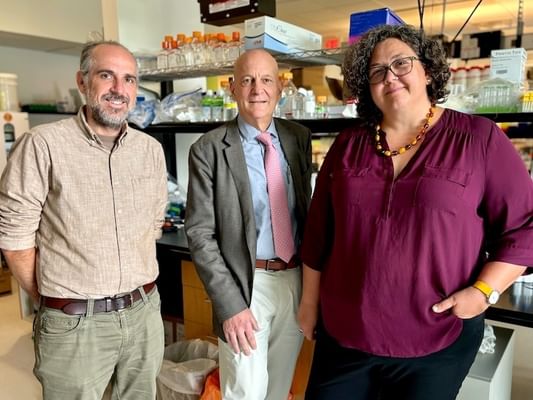- Undergraduate
Bachelor's Degrees
Bachelor of ArtsBachelor of EngineeringDual-Degree ProgramUndergraduate AdmissionsUndergraduate Experience
- Graduate
Graduate Experience
- Research
- Entrepreneurship
- Community
- About
-
Search
All Thayer News

Dartmouth Engineering Leads Team Selected for ARPA-H Award to Develop Novel Technologies for Precise Tumor Removal
Aug 13, 2024 | by Catha Mayor
Dartmouth Engineering will lead one of the first eight teams announced today by the Advanced Research Projects Agency for Health (ARPA-H) to receive an award through its Precision Surgical Interventions (PSI) program. An agency within the US Department of Health and Human Services (HHS), ARPA-H is committing up to $31.3 million over seven years to the Dartmouth-led team to create a laparoscope-integrating imaging solution that will be especially helpful in prostate cancer surgeries.

Project team leaders (l to r): Dartmouth Engineering professors Ryan Halter, Keith Paulsen, and Kimberly Samkoe (Scott Davis not pictured). (Photo by Catha Mayor)
The ARPA-H announcement builds on President Joe Biden and First Lady Jill Biden's "Cancer Moonshot" with the goals of reducing the cancer death rate in the US by at least half—preventing more than 4 million cancer deaths—by 2047, and improving the experience of people who are touched by cancer.
Dartmouth's team will use nerve and vascular contrast agents to cause these critical anatomical structures to fluoresce. They will then map and visualize the 3D shape and depth of the structures.
"Injury to nerves, vessels, ducts, or glands during prostate surgery can cause devastating complications," says Kimberley Samkoe, a Dartmouth Engineering professor and team leader on the project. "It's currently not possible to image these subsurface structures in real time. The goal of the project is to be able to identify and locate the structures such that surgeons can make rapid intra-operative decisions to avoid unnecessary injury to the patient."
Additional team leaders are Dartmouth Engineering professors Keith Paulsen, Ryan Halter, and Scott Davis. They and Samkoe will lead researchers at six collaborating organizations: Dartmouth Health, Dartmouth start-up QUEL Imaging, Johns Hopkins University, Oregon Health and Science University, Intuitive Surgical, and Trace Biosciences.
Dartmouth has a proven history of biomedical engineering innovations in optical imaging, visualization, and surgical interventions for clinical translation. All awardees were selected for their potential to develop methods and techniques to improve cancer detection and increase the visibility of critical anatomical structures during surgery.
"With the Precision Surgical Interventions program, we're seeking to fundamentally change how surgery is done. PSI and its technical performer teams are committed to developing tools that reduce the rate of reoperations or accidental damage to critical structures," said Ileana Hancu, ARPA-H PSI Program Manager.
The PSI program mandates that all performers design solutions that are compatible with all users. For example, if designing a tool for surgeons, the tool must fit different hand sizes. PSI mandates that all performers also be committed to equitable access and the development of medical devices that will be useable in virtually any hospital. As such, PSI performers must prioritize lower-cost solutions in their designs and test their devices in a rural hospital during the program. Furthermore, the devices must be validated in patient populations that reflect the demographics of the disease studied.
For contacts and other media information visit our Media Resources page.
